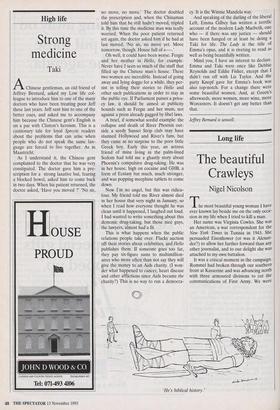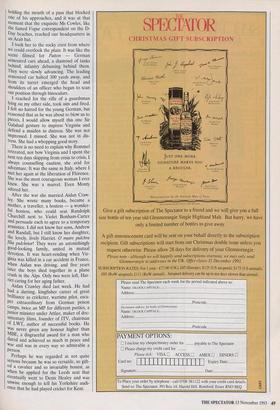Long life
The beautiful Crawleys
Nigel Nicolson
The most beautiful young woman I have ever known lay beside me on the only occa- sion in my life when I tried to kill a man.
Her name was Virginia Cowles. She was an American, a war correspondent for the New York Times in Tunisia in 1943. She persuaded Eisenhower (or was it Alexan- der?) to allow her further forward than any other journalist, and to our delight she was attached to my own battalion.
It was a critical moment in the campaign. Rommel had broken through our southern front at Kasserine and was advancing north with three armoured divisions to cut the communications of First Army. We were 'He's biblical history.'
holding the mouth of a pass that blocked one of his approaches, and it was at that moment that the exquisite Ms Cowles, like the famed Vogue correspondent on the D- Day beaches, reached our headquarters in an Arab hut.
I took her to the rocky crest from where we could overlook the plain. It was like the scene filmed for Patton — German armoured cars ahead, a diamond of tanks behind, infantry debussing behind them. They were slowly advancing. The leading armoured car halted 300 yards away, and from its turret emerged the head and Shoulders of an officer who began to scan our position through binoculars.
I reached for the rifle of a guardsman lying on my other side, took aim and fired. I felt no hatred for the young German, but reasoned that as he was about to blow us to Pieces, I would allow myself this one Sir Galahad gesture to impress Virginia and defend a maiden in distress. She was not impressed. I missed. She was not in dis- tress. She had a whopping good story. There is no need to explain why Rommel retreated, nor how Virginia and I spent the next ten days skipping from crisis to crisis, I always counselling caution, she avid for adventure. It was the same in Italy, where I met her again at the liberation of Florence. She was the most courageous woman I ever knew. She was a marvel. Even Monty adored her.
After the war she married Aidan Craw- ley. She wrote many books, became a mother, a traveller, a hostess — a wonder- ful hostess, who could seat Randolph Churchill next to Violet Bonham-Carter and persuade each to agree to a temporary armistice. I did not know her sons, Andrew and Randall, but I still know her daughter, the lovely, lively Harriet. 0 matre pulchra Iuiza pulchrior! They were an astonishingly good-looking family, united in mutual devotion. It was heart-rending when Vir- ginia was killed in a car accident in France, When Aldan was driving, and five years later the boys died togetber in a plane crash in the Alps. Only two were left, Har- riet caring for her aging father.
Aidan Crawley died last week. He had had a darting, kingfisher career of great brilliance as cricketer, wartime pilot, esca- per extraordinary from German prison Famps, twice an MP for different parties, a Junior minister under Attlee, maker of doc- umentary films, founder of ITV, chairman of LWT, author of successful books. He was never given any honour higher than MBE, a disgraceful award for a man who dared and achieved so much in peace and War and was in every way so admirable a person, Perhaps he was regarded as not quite serious because he was so versatile, so gift- ed a cavalier and so invariably honest, as When he applied for the Leeds seat that eventually went to Denis Healey and was uttwise enough to tell his Yorkshire audi- ence that he had played cricket for Kent.



























































 Previous page
Previous page